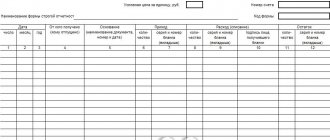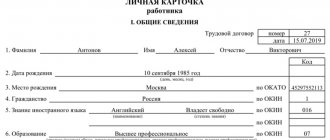2020-08-03 1722
The easiest way to organize accounting documentation and eliminate errors in it is to conduct an internal accounting audit. Such a check will protect the company from possible fines and problems with tax audits. It will help optimize accounting and document flow, and simplify relationships with banks and counterparties. From the article you will learn when an internal accounting audit is needed, how it is carried out and what the company receives as a result of such an audit.
The concept of audit and the key characteristics of this procedure
An audit of an enterprise's financial statements is a procedure during which errors in the preparation of accounting documents are identified and the accuracy of the reflection of mandatory financial indicators, assets and liabilities in them is checked. For many companies and entrepreneurs, such checks are a legal requirement.
It is important to understand that an audit is an independent verification , which means it is necessary to invite specialists from specialized audit companies. Sometimes a so-called “internal” type of audit is distinguished, when the audit takes place within the company by full-time employees.
But it is obvious that even a qualified accountant is not able to adequately and objectively check his own work . Moreover, he may be interested in concealing the violations committed. For this reason, it is preferable to entrust the audit to a specialized independent company that is not interested in falsification.
An audit of financial statements is a check of compliance of the financial statements of an organization or company with legal requirements.
Stages and order of inspections
Auditors and managers of enterprises should know that this activity is regulated by the law of the Russian Federation dated December 30. 2008 No. 307-FZ. It reflects the rules and procedure for the financial audit of an enterprise, reflects issues of professional ethics, and outlines the responsibilities and rights of auditors and officials of the enterprise. It also describes in detail the disciplinary measures taken by auditors for violating professional standards.
If the initiator of the audit is the management of the enterprise, the terms and conditions, direction and procedure are determined by agreement with the customer. Mandatory inspections have different deadlines. The beginning of the first quarter of the reporting year is the busiest time for audits. This involves submitting annual financial statements to tax departments no later than 90 days after the reporting period.
The stages of an audit can be represented as follows:
- Preparatory stage. The period when the inspection schedule is discussed and formed. On the eve of this deadline, relevant letters are sent to enterprises, an audit team is formed, and relevant documents are requested for a desk audit;
- Working stage. At this stage, a group of auditors collects and processes primary accounting documents and analyzes the data received. The compliance of reflected transactions with the registers of regulatory requirements is determined. The compliance of statutory documents, permits, and availability of licenses is checked. Availability of business agreements and compliance with financial discipline;
- The final stage. An audit report is generated and issued to the customer. The process consists of processing and analyzing the collected data on the economic activities of the enterprise and the reliability of financial reporting documents.
Serious misstatements in the financial statements may prevent the auditor from verifying the authenticity of all or part of the financial statements. In this case, the customer is issued a modified audit report.
All information about the audit in terms of cost of services and audit results are considered strictly confidential information. Therefore, professional ethics does not allow disclosure and discussion with third parties. Exceptions may occur in cases provided for by current legislation.
Why are checks carried out?
The main purpose of the audit is an objective assessment of the legality, correct accounting of the company, as well as the accuracy of the reflection of all financial indicators in it. To do this, specialists consistently solve the following tasks:
- Checking financial statements, regularity and correctness of maintaining all legally required documentation.
- Analysis of the completeness of displaying all necessary provisions, including costs, profits and financial results of the company.
- Identification of financial reserves, the volume of borrowed funds and search for ways to better use money.
What are the objectives of accounting audit
Companies order an audit of their accounting organization for a variety of reasons. The main purpose of the audit is an independent expert assessment, which is usually needed to confirm financial solvency and honesty, control tax risks and routinely identify accounting shortcomings (checking the competence of employees).
The results of the procedure help the manager get a complete picture of the work of his company and select ways for its further development. Therefore, an audit of financial statements is useful for:
- identifying promising directions for greater development of the organization’s activities;
- identifying minor and significant errors in the company’s reporting documentation;
- making recommendations for making adjustments to financial statements;
- determining the degree of professionalism of employees and the level of accounting;
- identifying reserves that can further ensure the financial growth of the company;
- preparation for tax audit.
It is worth remembering that even the most competent accountants can make mistakes that can lead to large losses for the company. The examination concentrates entirely on document verification and significantly reduces business risks. An important advantage of the procedure is that it helps to find errors before they can spoil the situation and lead to fines.
As for the audit report itself, it is a kind of guarantor of the integrity of all reporting and strengthens the organization’s position in the market. It is easier for companies to enter into cooperation with other enterprises, and their relations with regulatory authorities and financial institutions become somewhat simpler.
The legislative framework
The main legislative act on which the work of auditors is based is the federal law “On Auditing Activities” of December 30, 2008. The term “audit” is disclosed in Article 7 of this act. In addition, in the text of the law you can find out that an audit is mandatory when a number of legally prescribed conditions are met .
All entrepreneurs and businessmen who are faced with the need to carry out this procedure must be familiar with the text of this law. At the end of 2020, changes were made to the federal law. In addition to this act, the procedure for conducting audits is regulated by federal standards for the activities of auditors, certain legislative norms and the rules of professional accredited communities .
An audit is mandatory when a number of legally prescribed conditions are met
What is an audit and its types
An audit of financial statements is the implementation of strictly defined methods of checking the data contained in the accounting reports in order to establish the degree of reliability.
The audit of financial statements is carried out in accordance with current regulations in several stages.
They can be roughly represented as follows:
- collection of information;
- carrying out the study of all submitted data without exception;
- making a decision, which should contain the auditor’s opinion on how much the presented data can be trusted.
- The opinion of an independent specialist is issued in the form of a conclusion. It reflects how much you can trust the reporting data.
Attention: drawing up an audit report is the final stage of the audit.
It must be remembered that the auditor is given the right to present an audit report in the form of a refusal to confirm the reliability of the information contained in the report. Depending on who is the initiator of the verification of the data contained in the report, the following types of audit are distinguished:
- The audit is mandatory due to the law. A mandatory audit is possible based on a decision made by a judge. Only accredited specialists are allowed to conduct such an audit. When implementing it, specialists must be guided by accepted auditing standards.
- Initiative audit - It is carried out on the basis of a decision of the founders of the organization or by order of the company’s management. With this type of audit, the scope of work and objects of study are determined based on the customer’s decision. The main purpose of such an audit is to assist the company in restoring its accounting records and providing advice to the customer.
Which organizations are required to undergo an audit?
It is important for an entrepreneur or company owner to know whether his business is subject to mandatory audit of the organization’s financial statements. To find out this circumstance, you need to refer to Article 5 of the above federal law. The article is quite lengthy and contains a very detailed list of areas. For example, all state corporations are required to undergo this procedure annually . Regarding private firms and companies, it can be summarized that only a few types are subject to mandatory audit:
- Types of joint stock companies (OJSC, CJSC, PJSC).
- Credit organizations (including microfinance).
- NPF (non-state pension funds).
- Housing savings cooperatives.
- Organizers of gambling.
- Association of tour operators and individual tour operators working in the field of outbound tourism.
- Political parties.
- Self-regulatory organizations (NGOs that unite entrepreneurs in a certain industry).
- Investment funds.
- Insurance funds.
In addition, an audit will be required if the company does not belong to the above categories, but its revenue for the past year exceeded 400 million rubles or the company’s securities were admitted to organized trading.
For most companies subject to mandatory annual audits, public accounting statements are required. This is the name given to the publication of an organization’s financial indicators in the media or in a separate edition.
The nuance is that the publication is recognized as legal only when it is prepared based on the results of an audit. Legislation requires mandatory publication in print media (newspapers or magazines) or distribution of booklets and brochures. Publishing a report on the Internet is not enough.
Such companies are required to undergo an annual audit under a contract concluded with a specialized company selected based on the results of an open competition. For companies that do not fall under the characteristics specified in this article, the law does not require a mandatory audit.
However, the range of organizations that need an audit is not limited to the listed categories. An audit is useful for most businesses , for example, to assess the quality of work of accountants, identify possible violations and adjust the approach to financial policy.
An audit is useful for most businesses
Audit of financial organizations
An audit of financial organizations is a comprehensive study and assessment of the financial position of a company with subsequent consideration of development prospects. Financial organizations where auditing is mandatory are legal entities engaged in banking and non-banking operations, operating in the securities market, insurers, microfinance and credit firms, non-state pension funds and many others. An audit of financial organizations must be performed by an audit company, and, most importantly, it can only be performed by auditors who have a “single” certificate issued after January 1, 2011.
The cost of auditing financial organizations is from 30,000 rubles
The information collected during the audit allows you to:
- detect legislative violations in the accounting sector;
- analyze the rotation of the money supply;
- determine the effectiveness of the use of investment financial resources;
- draw up a development plan for the enterprise.
Order an audit of a financial organization
Types of audit
There are several approaches to audit classification. For example, they often distinguish between “external” and “internal” audit . This formulation is not strictly correct. In this approach, “external” refers to an audit performed by an external independent agency; it is rather an audit within the company, organized in-house. There is no guarantee that its results will reveal errors and actual violations, since the verifying party may well be interested in falsifying the results of the documentation analysis.
Audits are also often divided into:
- Special . The goal is to study specific documents or operational issues and the company’s compliance with procedures prescribed by law.
- Audit of financial statements . This is a large-scale analysis of the entire volume of the company’s financial documents for the reporting period, for example, annual financial statements.
Regularity is often used as a classification criterion. For example, there is an “initial” audit - the first for - carried out regularly. In the economic literature one can find another division of audit procedures.
Separately, it is worth highlighting such a direction of inspections as “express audit”. This is the name for a quick and selective analysis of documents, the reason for which is often some kind of emergency. For example, an unexpected crisis situation in the company or the owner’s suspicions about irregularities in the company’s work.
The express audit technique involves an oral conversation with the responsible person of the company (usually the chief accountant) and a random check of documents. This method is good enough for quickly searching for violations and shortcomings, but does not provide a comprehensive picture of the state of the company.
Express audit is good for quickly finding violations and shortcomings
What documents need to be prepared for an audit?
The list of documentation that inspection specialists will study is very extensive. Mandatory minimums include:
- statutory documents of the company, including the memorandum of association (if any);
- extract on entry into the Unified State Register of Legal Entities;
- certificate of registration with the tax service;
- licenses and certificates;
- information about bank accounts;
- tax and accounting reporting for the analyzed period;
- agreements with counterparties;
- acts, invoices, funds accounting cards;
- staffing schedule and documents of the HR department;
- calculations for the distribution of indirect costs;
- tax registers;
- audit report for the previous period (if available).
What are the stages of an audit?
Verification of accounting and financial statements takes a long time. As a rule, the entire procedure lasts at least 1 week , and if the company’s sales volume reaches 100 million rubles, the work of auditors will take 3-4 weeks.
The audit includes the following stages:
- Preparation planning. At this stage, the composition of the audit team is formed, the work procedure is agreed upon with the audited party, organizational issues are resolved, tasks are determined and an audit plan is developed. It is worth knowing that in the case of the very first or particularly complex inspection, a lawyer is often included in the team. Its task is to evaluate the organization’s constituent documents, concluded contracts and agreements, and evaluate the procedure approved within the company (for example, auctions). The lawyer also takes part in drawing up a final report based on the results of the entire audit.
- Direct verification of documentation. Specialists work with papers and also interact with the chief accountant and individual employees responsible for certain areas of work. Auditors have the right to ask oral questions and send written requests. The audited party has a similar right: auditors can be asked questions throughout their work, both orally and in writing.
- Summing up the results , drawing up a report and sending it to the management of the audited organization. Traditionally, audit firms prepare two documents: an audit report and an explanatory note, which describes all the significant materials of the audit. Errors and shortcomings indicated in the explanatory note are subject to prompt investigation, analysis and elimination.
The company may receive a favorable opinion with an opinion that is not unconditionally favorable
If the study did not reveal any violations, and the company met the inspection specialists halfway, providing all the necessary papers and answering all requests, the auditors issue an unconditional positive conclusion with a positive opinion.
In a similar situation, when no deficiencies were found, but any document was missing or a response to the request was not received, the company may receive a positive conclusion with an opinion that is not unconditionally positive or with a disclaimer of opinion .
However, the inspection may not go so smoothly, and alternatively, the organization will receive a negative conclusion. In the event that any violation in the company’s work is indicated in a report or explanatory note, but is not eliminated by the company before the next inspection, the head of the company risks receiving a negative audit report and penalties from regulatory authorities.
How much does an audit cost?
The cost of conducting an independent assessment of accounting and financial statements directly depends on the type of audit (full or special) and the size of the company (the more documentation specialists have to evaluate, the more you will have to pay). The price for an audit starts from 50 thousand and can reach several million rubles.
Some companies estimate the cost of an audit in audit hours , that is, the price will directly depend on the time that specialists work with the company’s documents. Prices per hour vary from 2,000 to 10,000 rubles. Some organizations attract clients with lower prices (up to 200 rubles per hour), but you need to check whether this is a scam.







